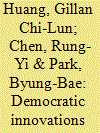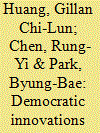|
|
|
Sort Order |
|
|
|
Items / Page
|
|
|
|
|
|
|
| Srl | Item |
| 1 |
ID:
178823


|
|
|
|
|
| Summary/Abstract |
Our paper critically assesses the trajectories of nuclear energy policy-making in Taiwan and South Korea through the lens of state-led democratic innovation. Nuclear energy is as controversial as the associated decision-making highly political, raising concerns with democratic participation. Generally, deliberative polls and referenda are considered more bottom-up and grassroots approaches to resolving complex energy issues. In Taiwan and South Korea, however, the state plays a key role in deciding what issues and decisions should be debated, and exercises control over the interpretation of the results. The strong state and centralised decision-making over energy policy means the processes in Taiwan and Korea differ markedly from Western energy transitions. These approaches not only undermine the credibility of the participatory process and the quality of civic engagement, but further polarise public opinion. The overall aim in producing this paper is to identify the how democratic participation differs between established Western democracies and East Asia's new democracies, and to investigate how deliberative polls and referenda were used not as a means to reflect public opinions on energy policy, but as a conduit for political actors to promote their own political agendas.
|
|
|
|
|
|
|
|
|
|
|
|
|
|
|
|
| 2 |
ID:
178824


|
|
|
|
|
| Summary/Abstract |
Our paper critically assesses the trajectories of nuclear energy policy-making in Taiwan and South Korea through the lens of state-led democratic innovation. Nuclear energy is as controversial as the associated decision-making highly political, raising concerns with democratic participation. Generally, deliberative polls and referenda are considered more bottom-up and grassroots approaches to resolving complex energy issues. In Taiwan and South Korea, however, the state plays a key role in deciding what issues and decisions should be debated, and exercises control over the interpretation of the results. The strong state and centralised decision-making over energy policy means the processes in Taiwan and Korea differ markedly from Western energy transitions. These approaches not only undermine the credibility of the participatory process and the quality of civic engagement, but further polarise public opinion. The overall aim in producing this paper is to identify the how democratic participation differs between established Western democracies and East Asia's new democracies, and to investigate how deliberative polls and referenda were used not as a means to reflect public opinions on energy policy, but as a conduit for political actors to promote their own political agendas.
|
|
|
|
|
|
|
|
|
|
|
|
|
|
|
|
| 3 |
ID:
181853


|
|
|
|
|
| Summary/Abstract |
The governance of cultural development and cultural industries in China has become an area of increasing academic interest in recent years. Here, we seek to understand the dynamics and uniqueness of the impacts of Red Culture and cultural governance in the city of Shanghai. The authors have selected the dimension of the political economy of museums to demonstrate how local authorities tread a difficult path, balancing multiple policy goals, including market incentives and ideological indoctrination, in the context of culture development. The case study of Shanghai demonstrates how museums reflect the renewal of party-state identity and market utilities. This article also examines what history means to this city today, and how historical elements are utilized in the course of urban transformation.
|
|
|
|
|
|
|
|
|
|
|
|
|
|
|
|
|
|
|
|
|